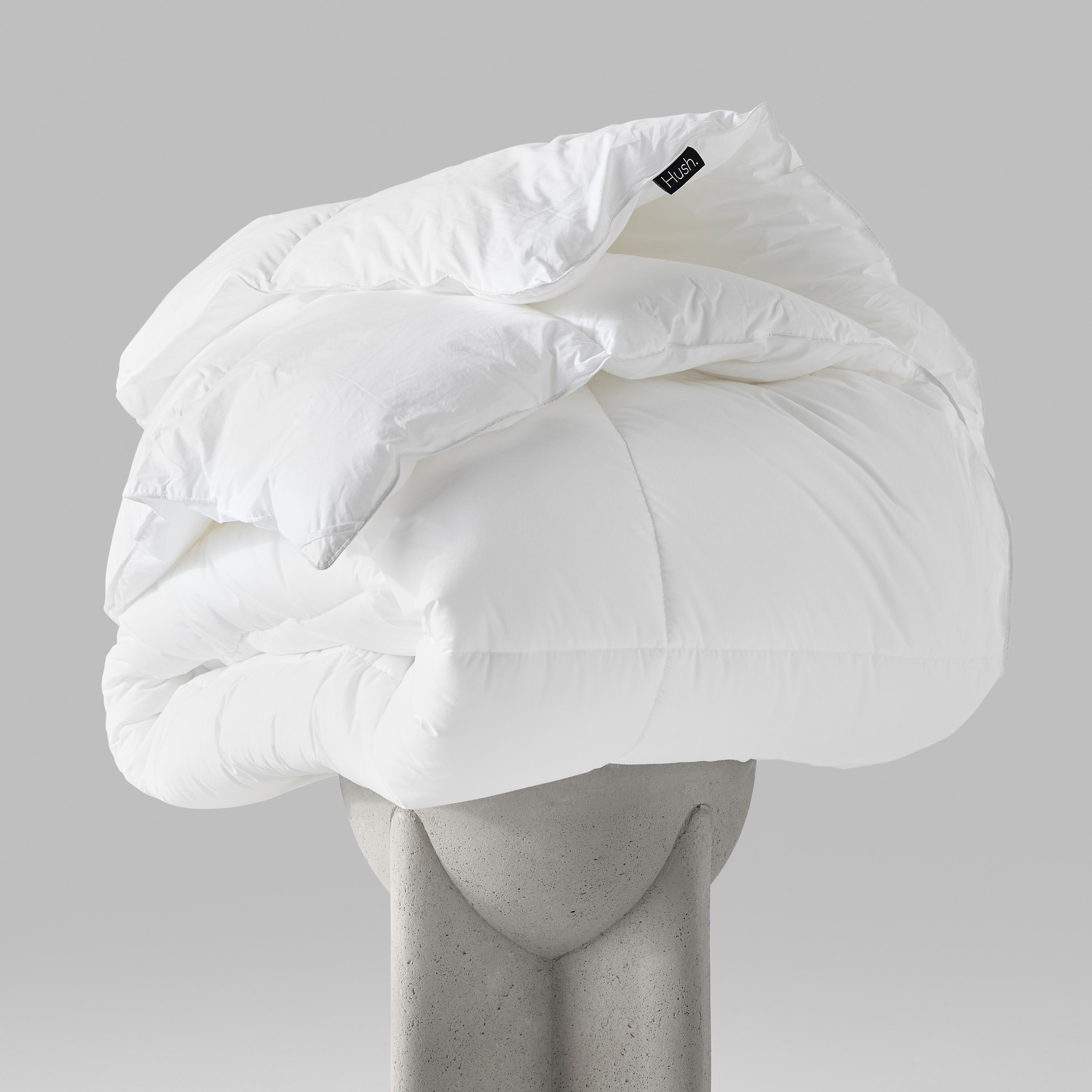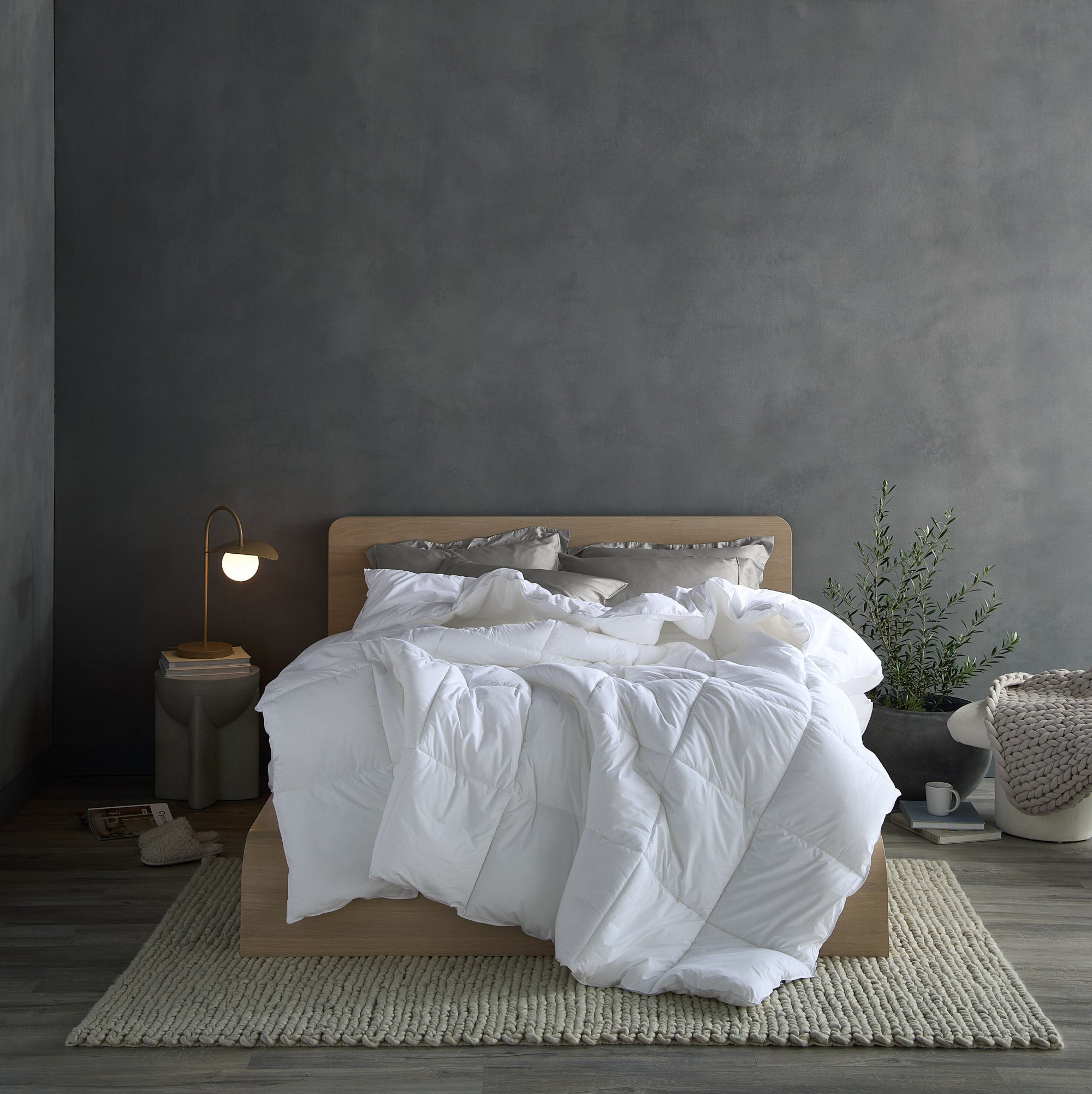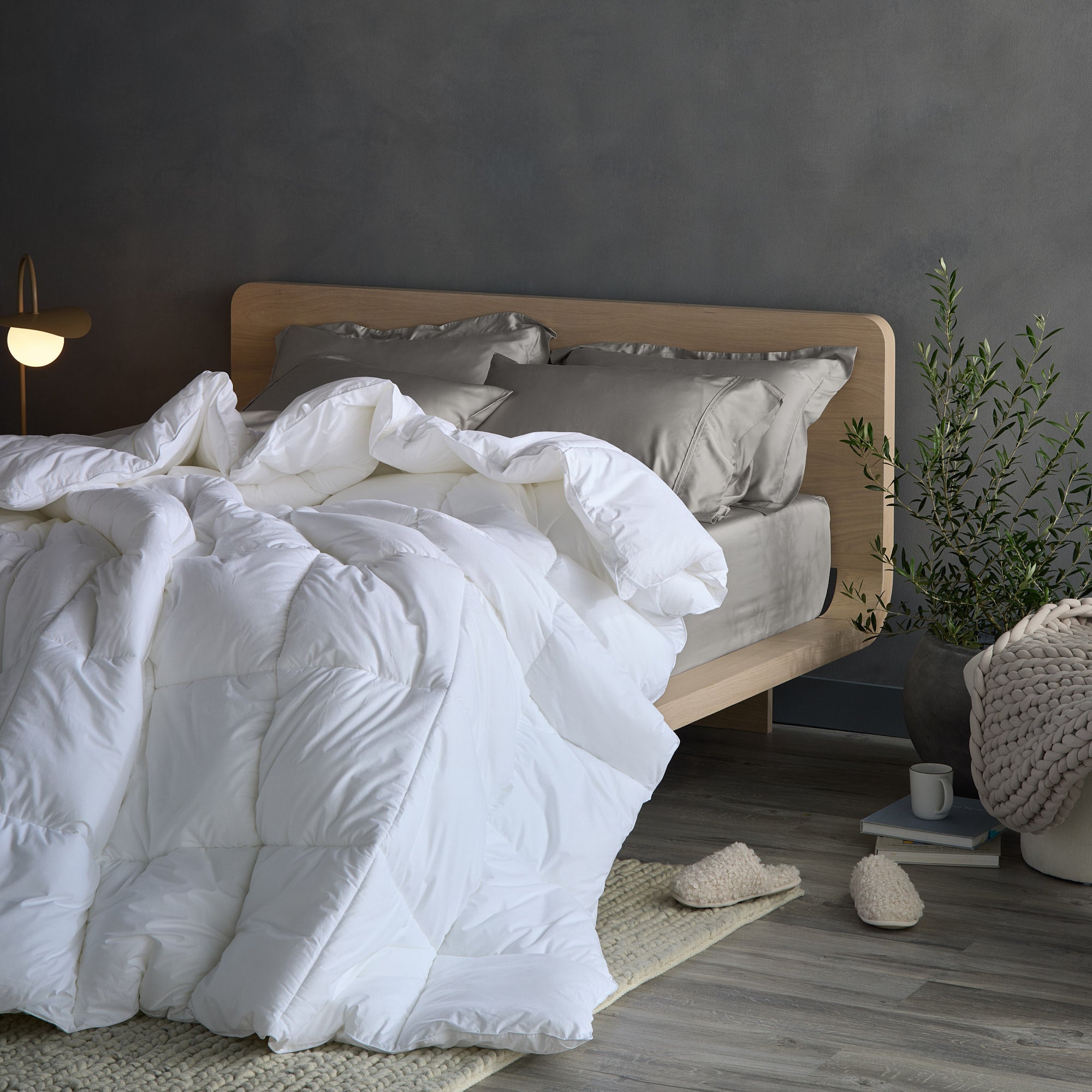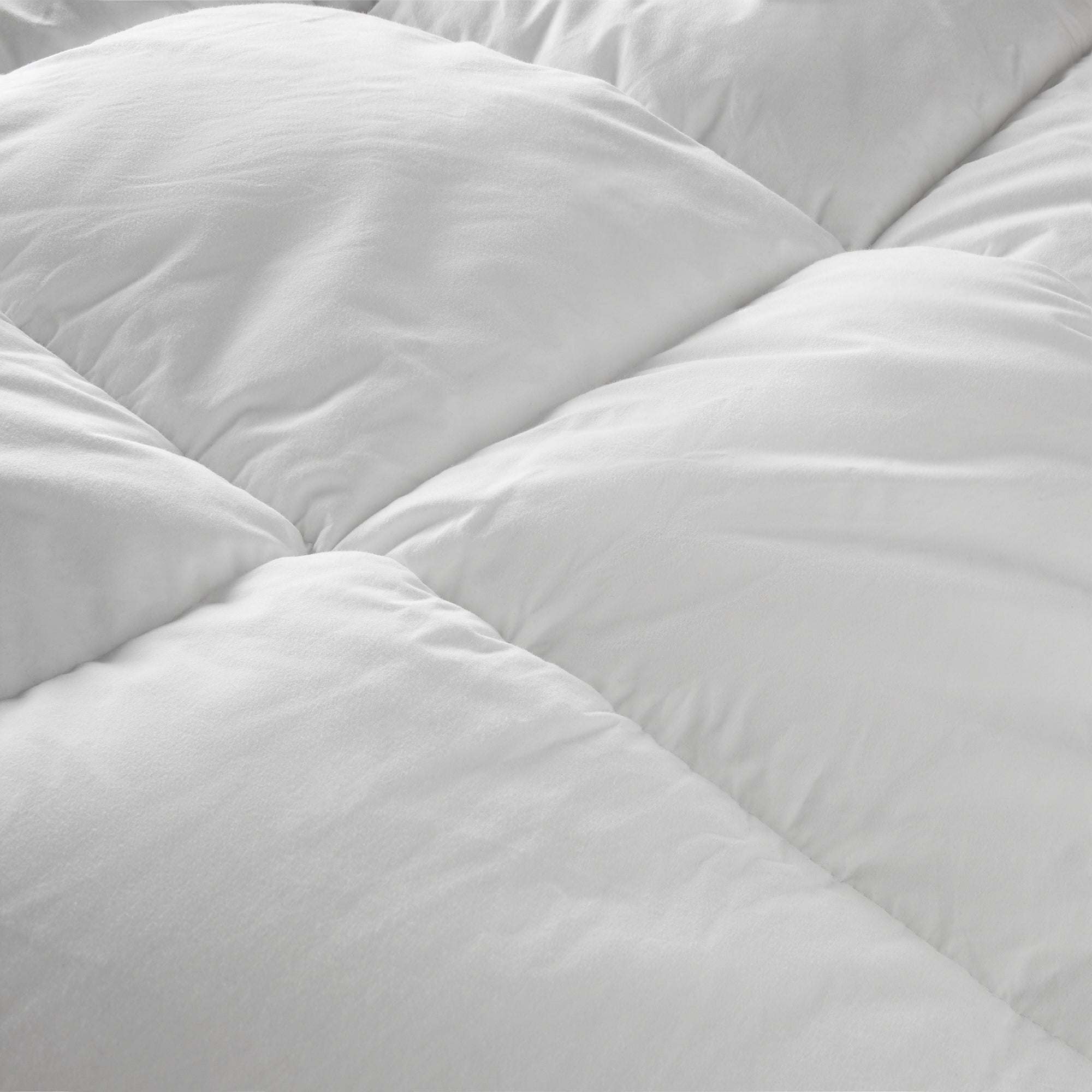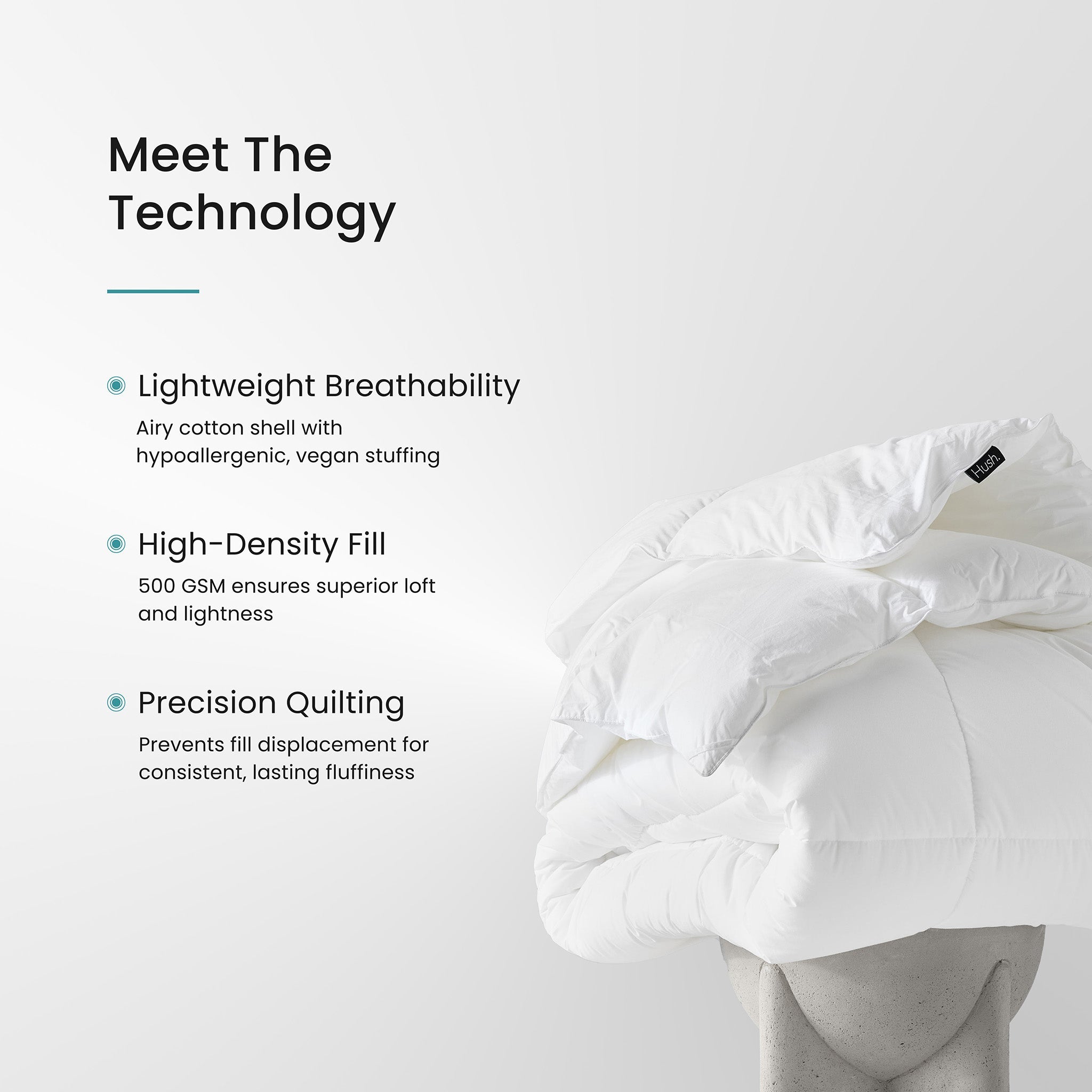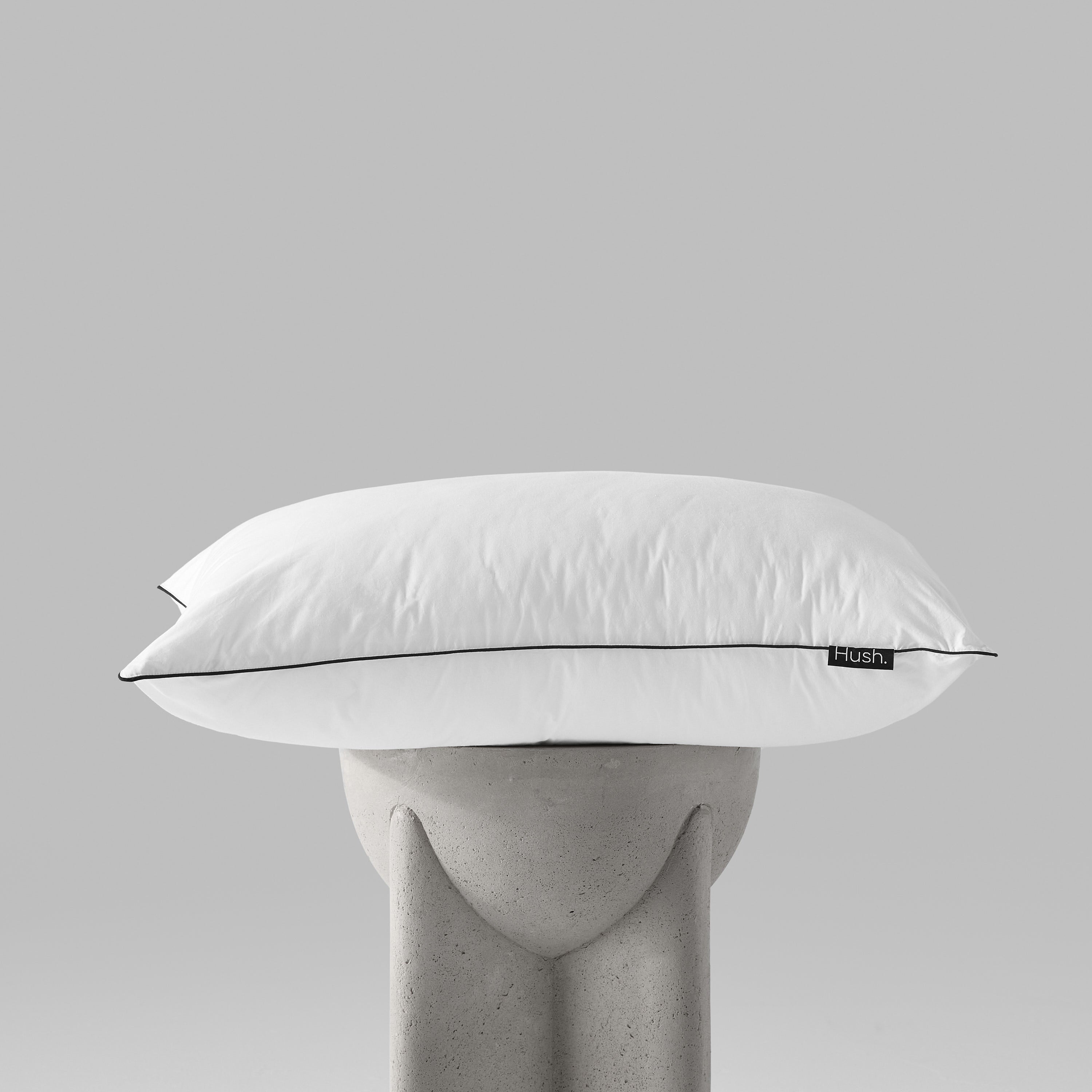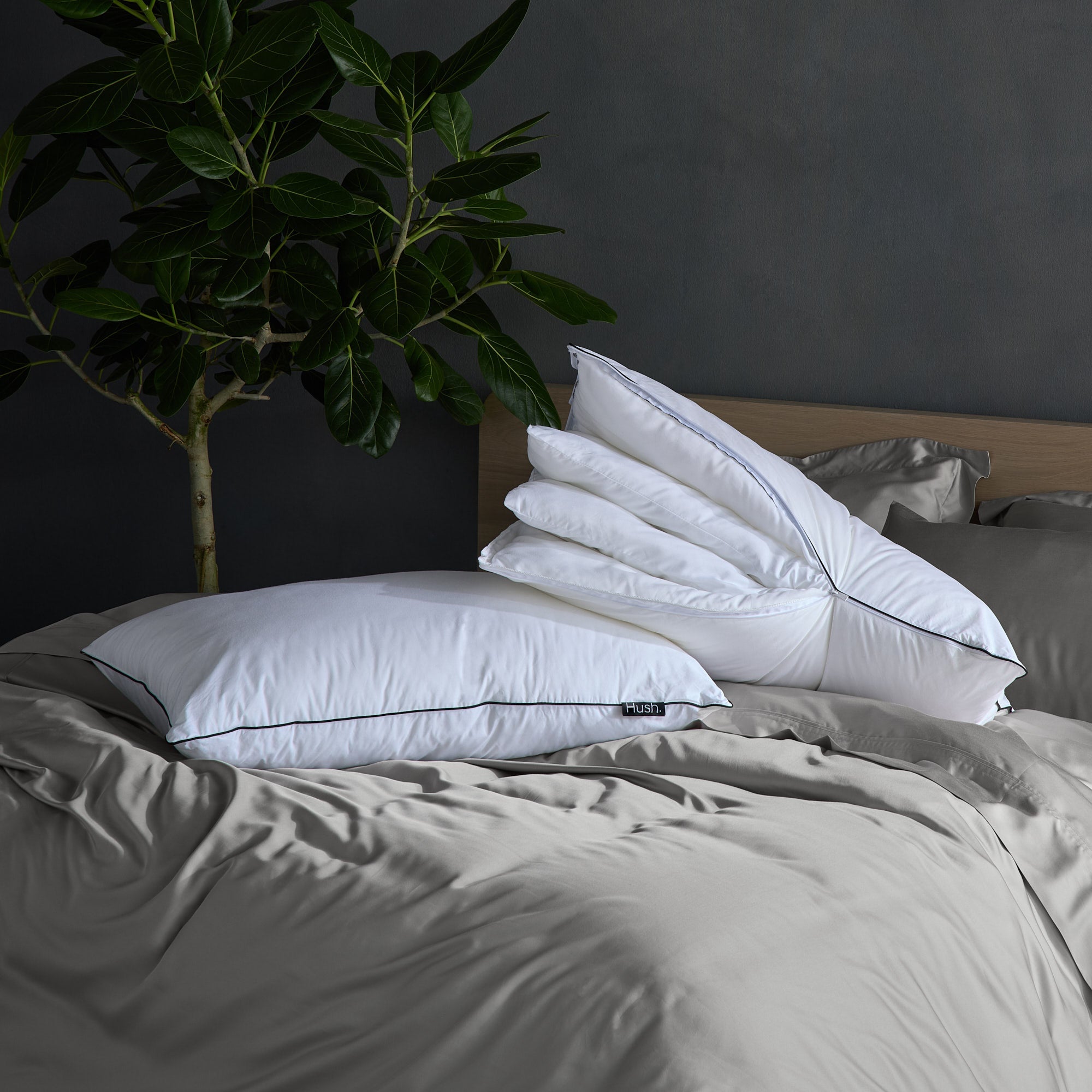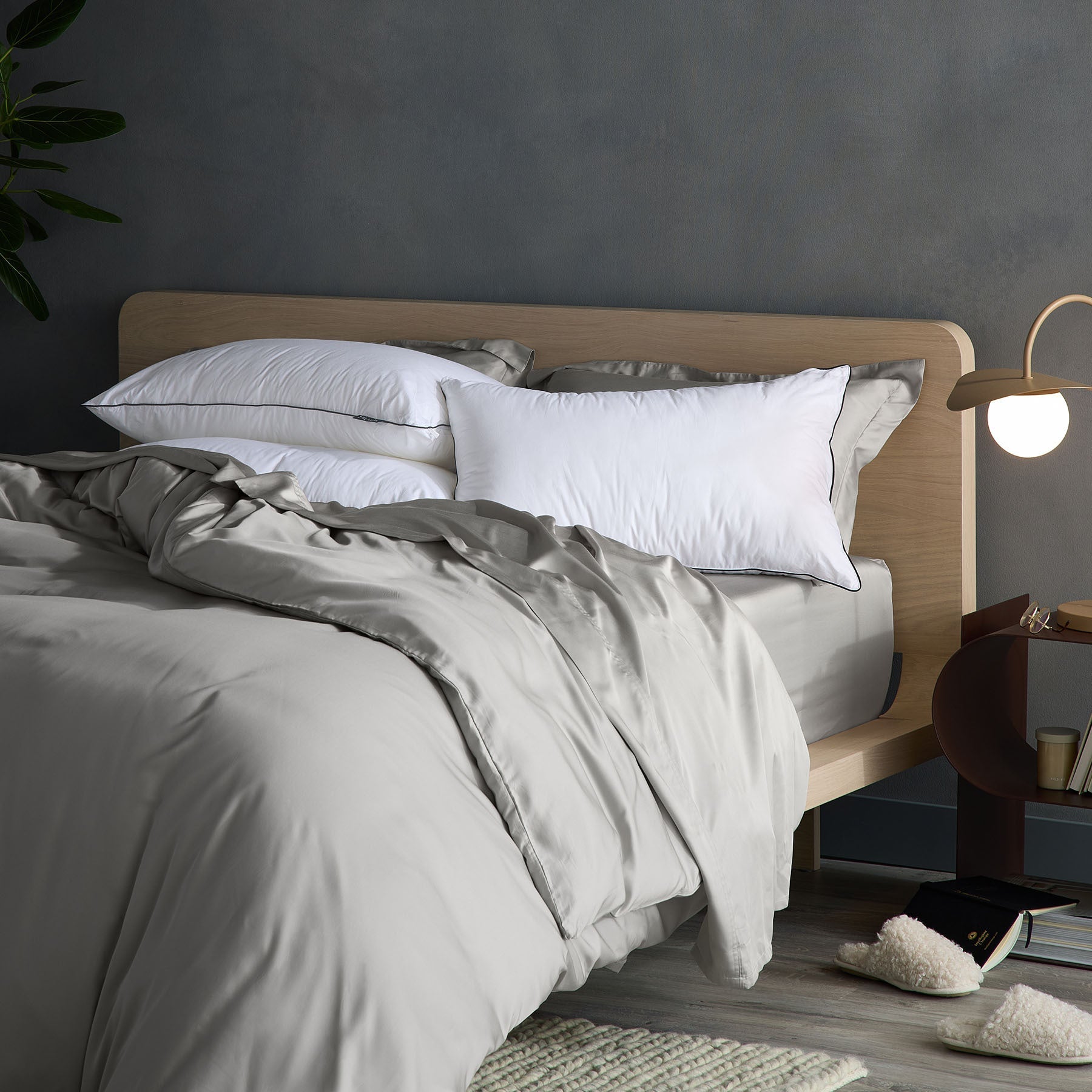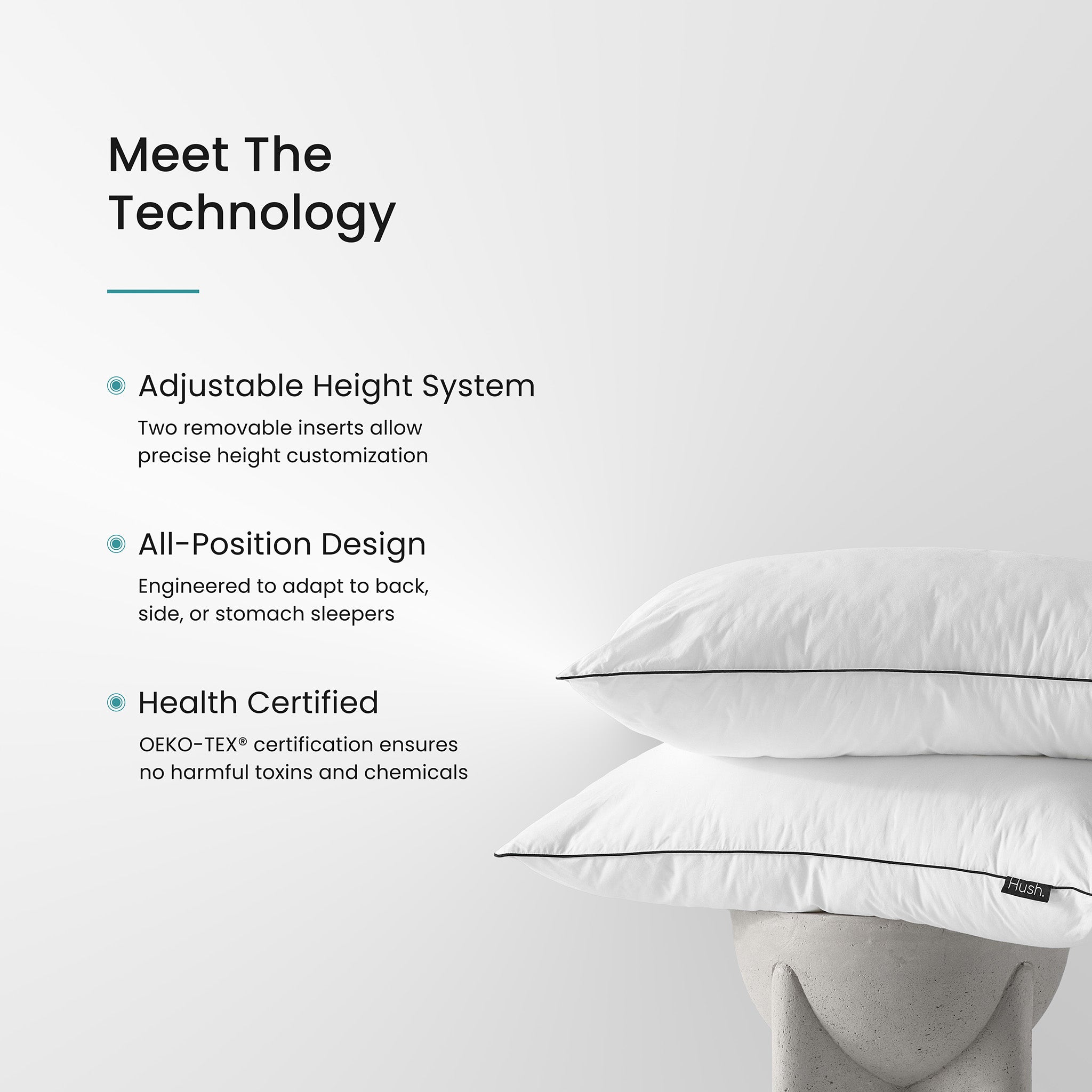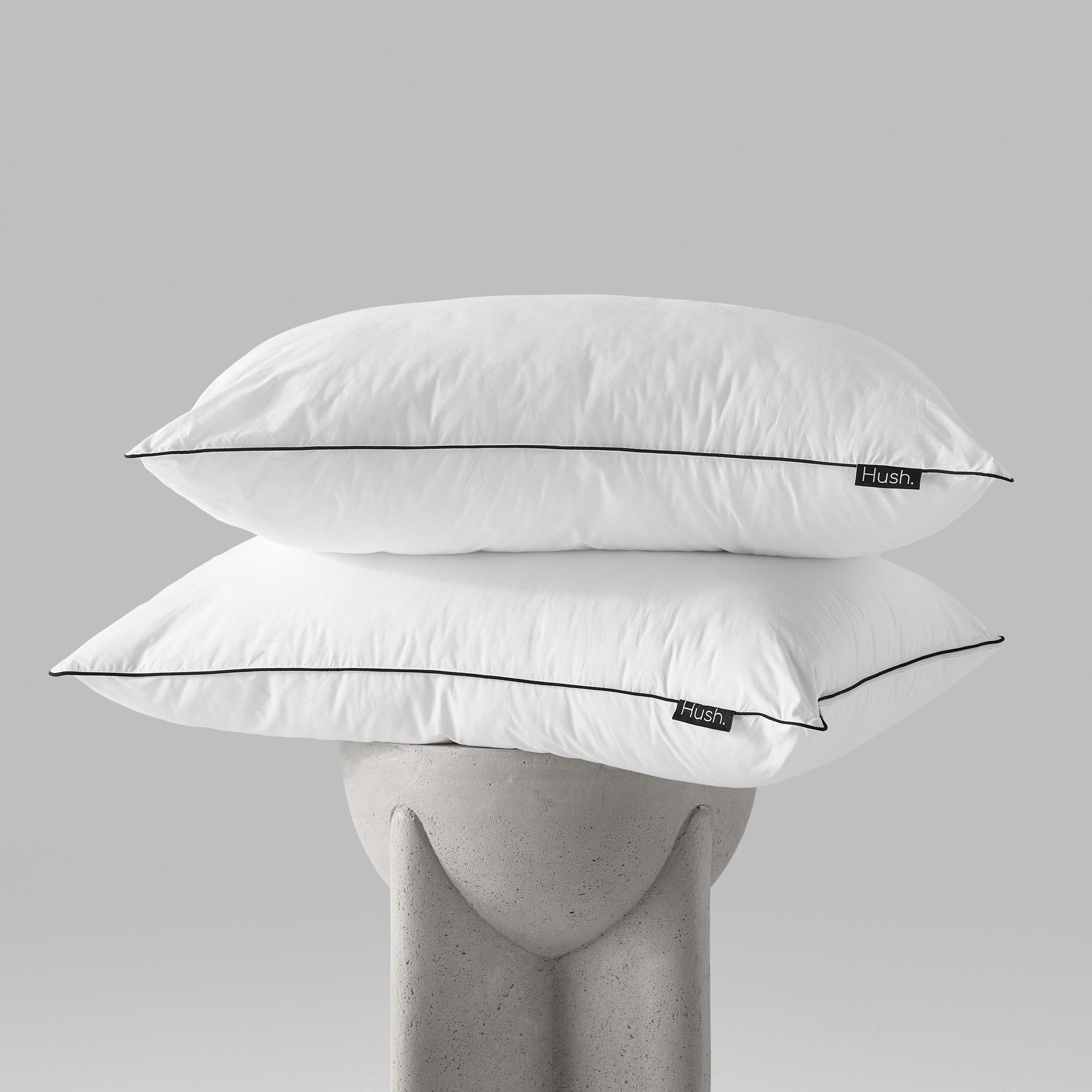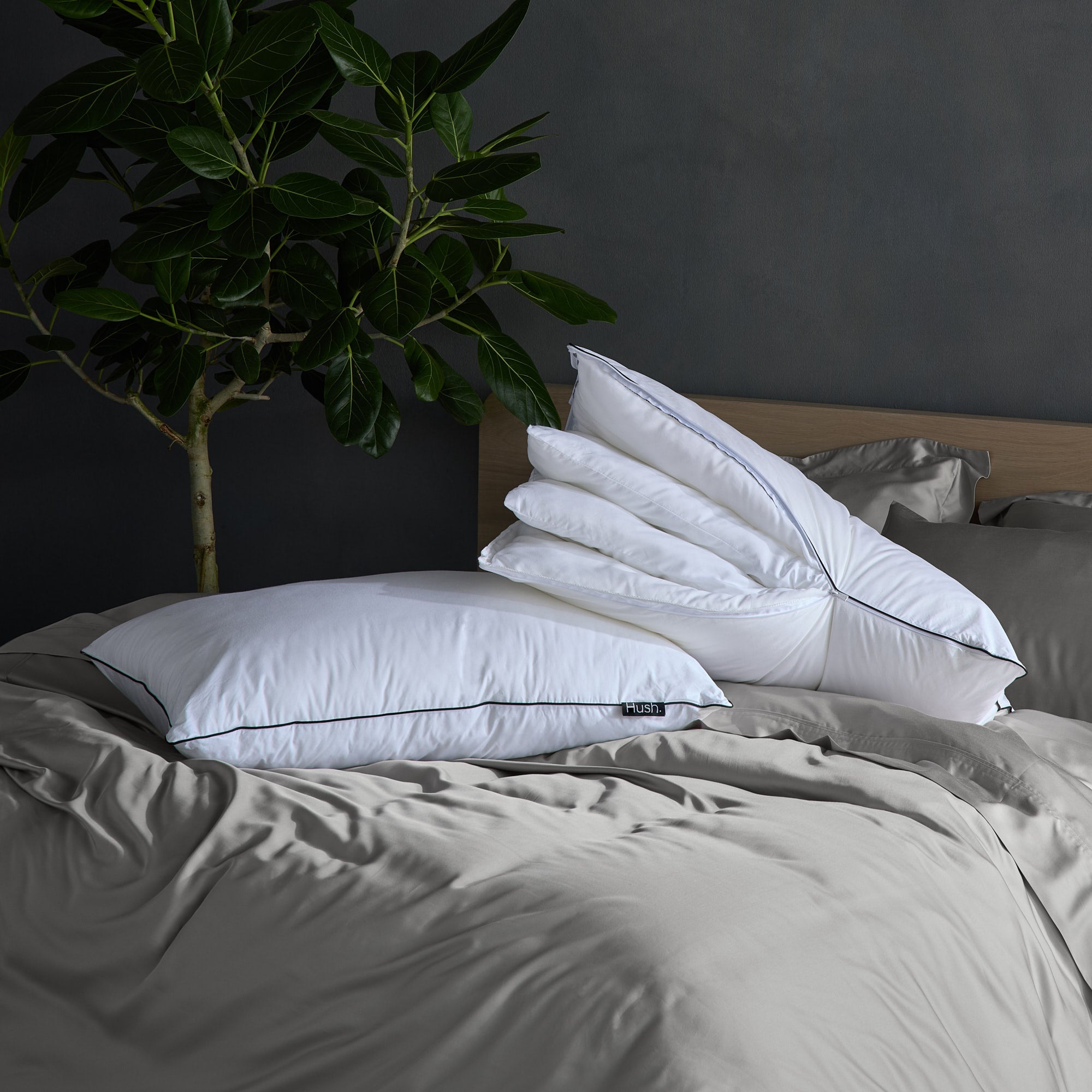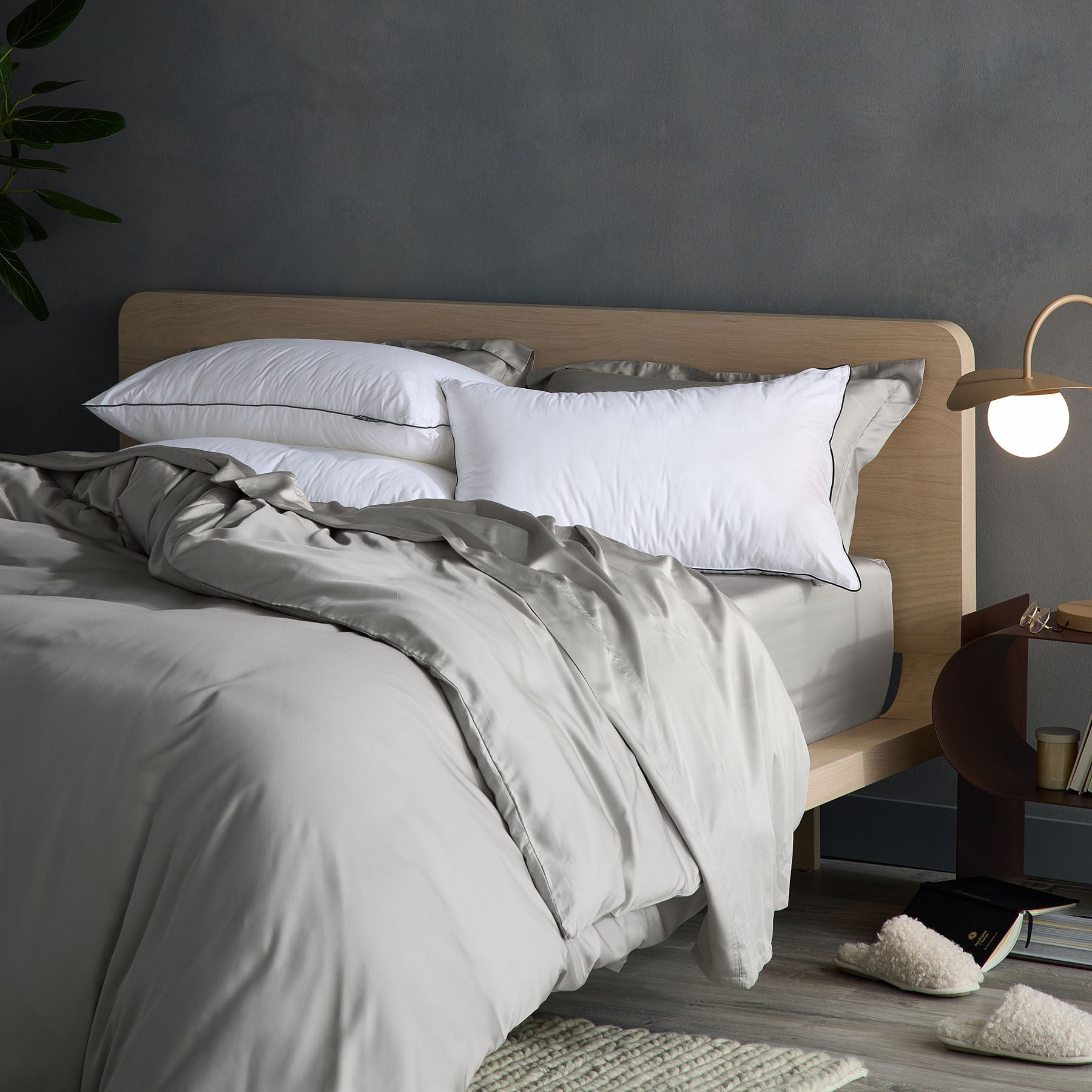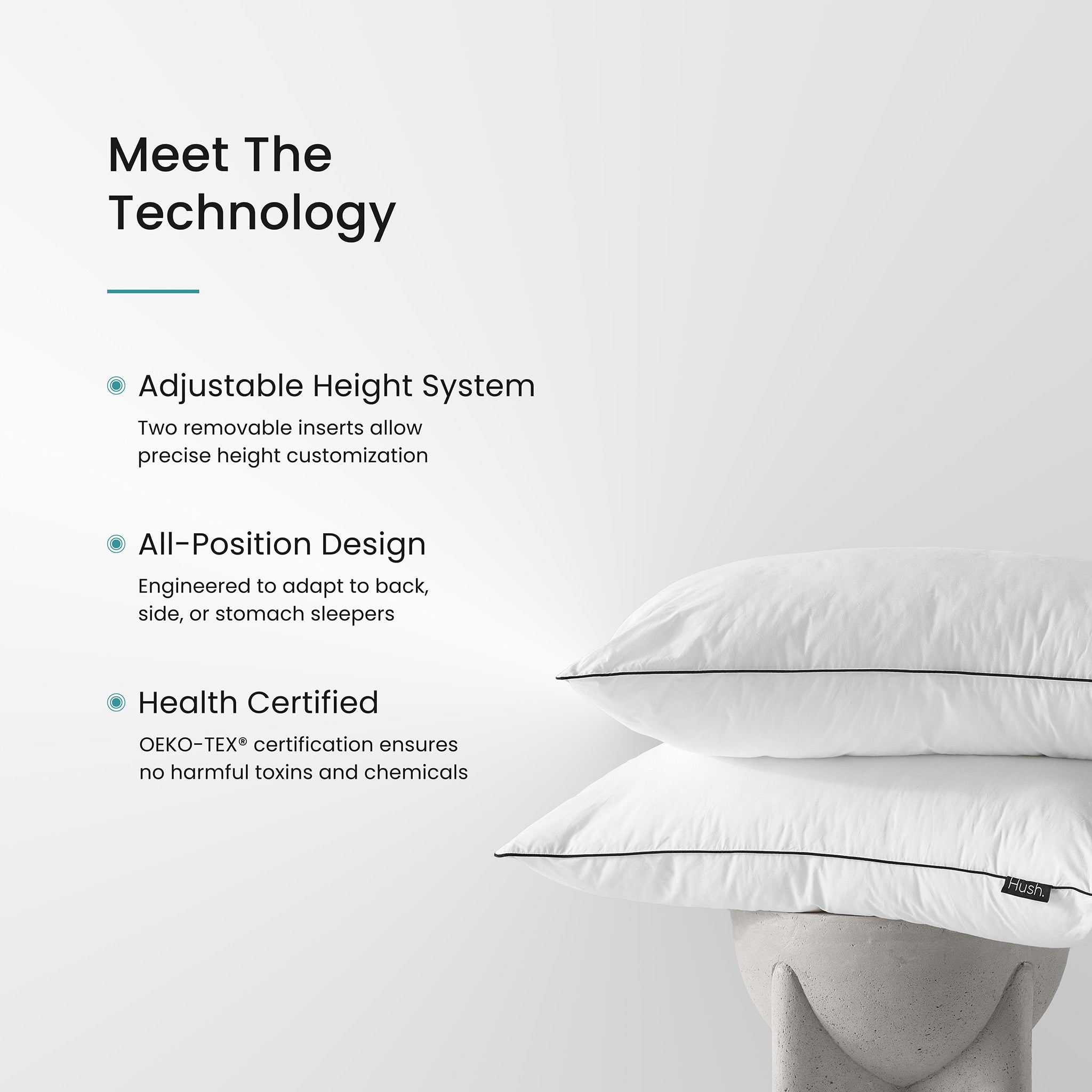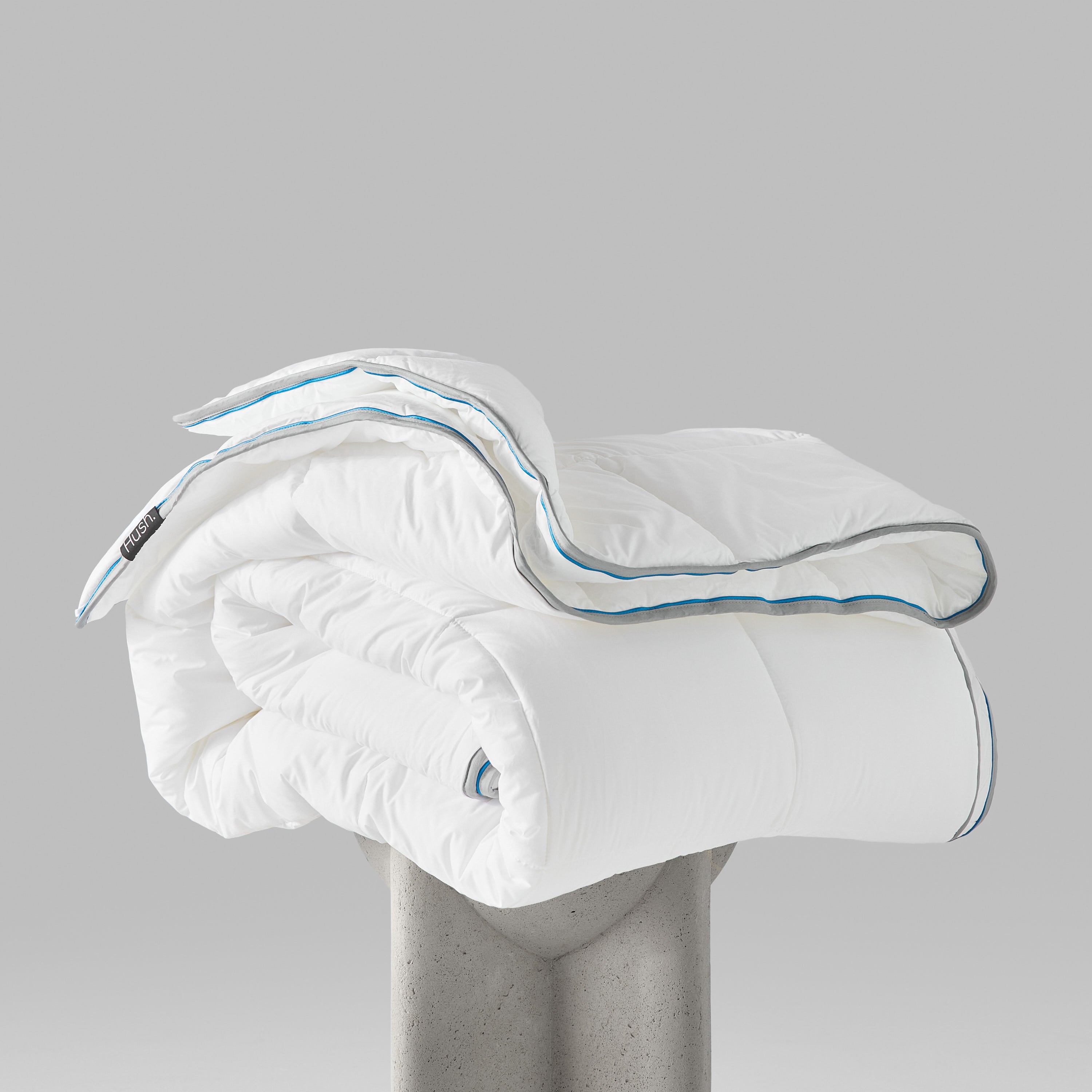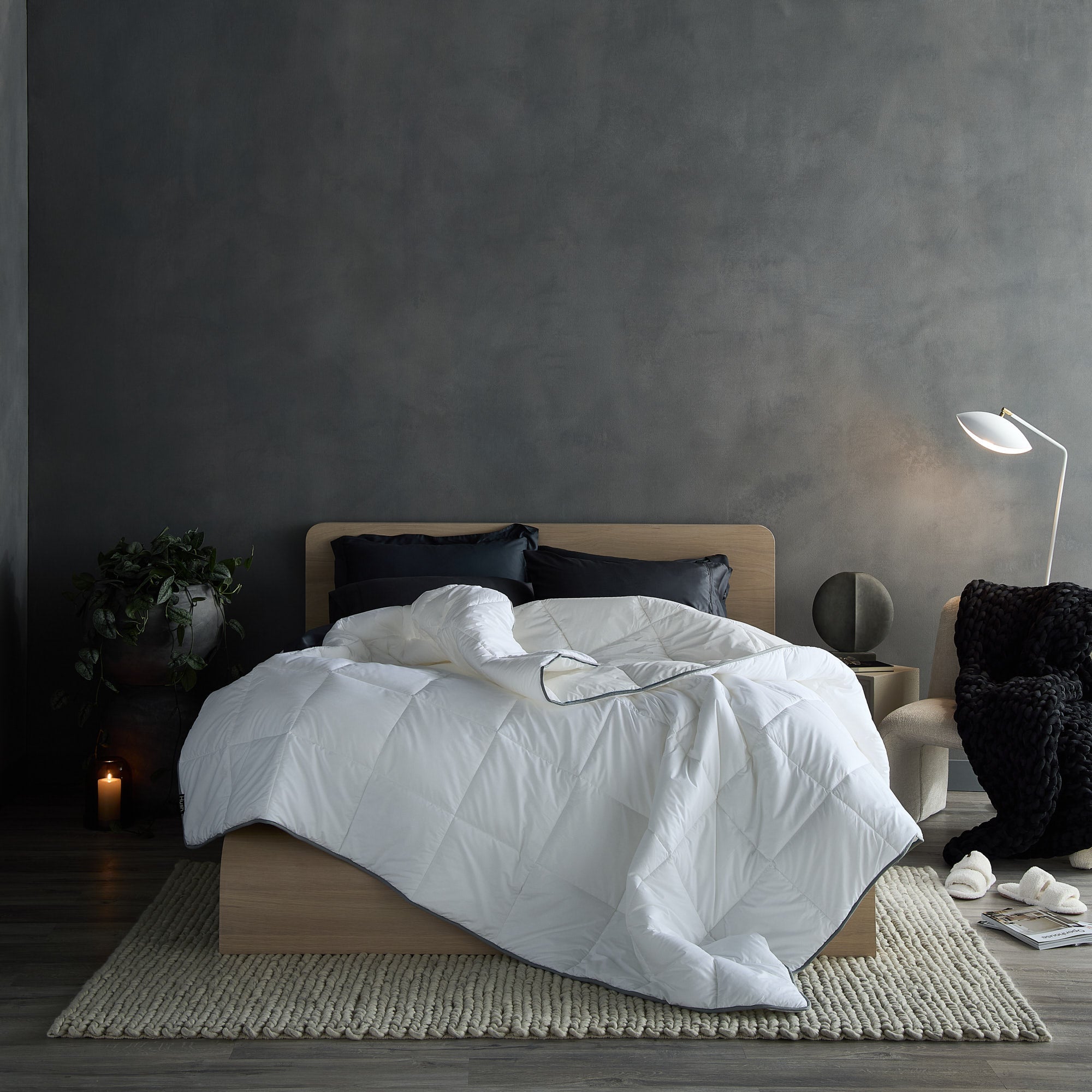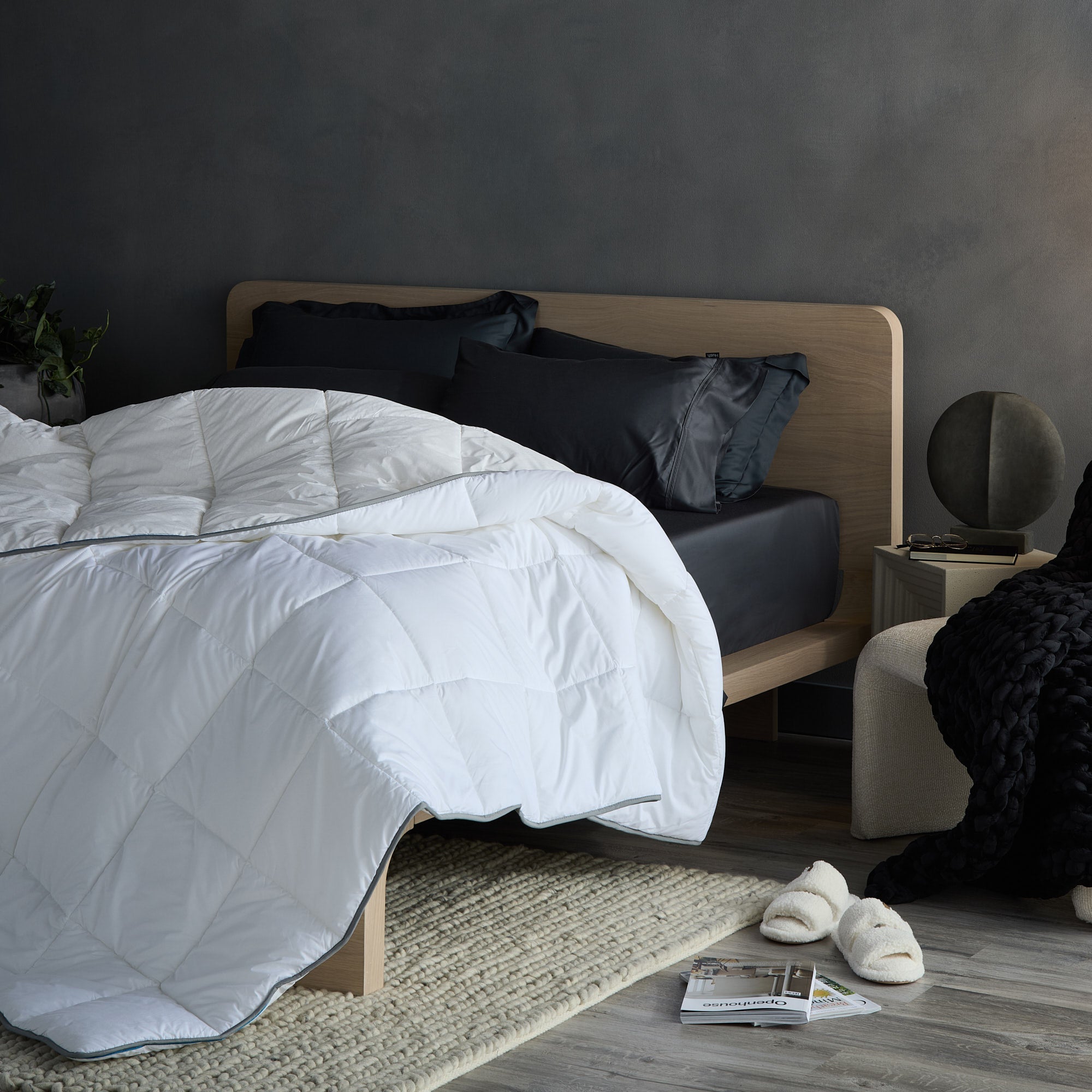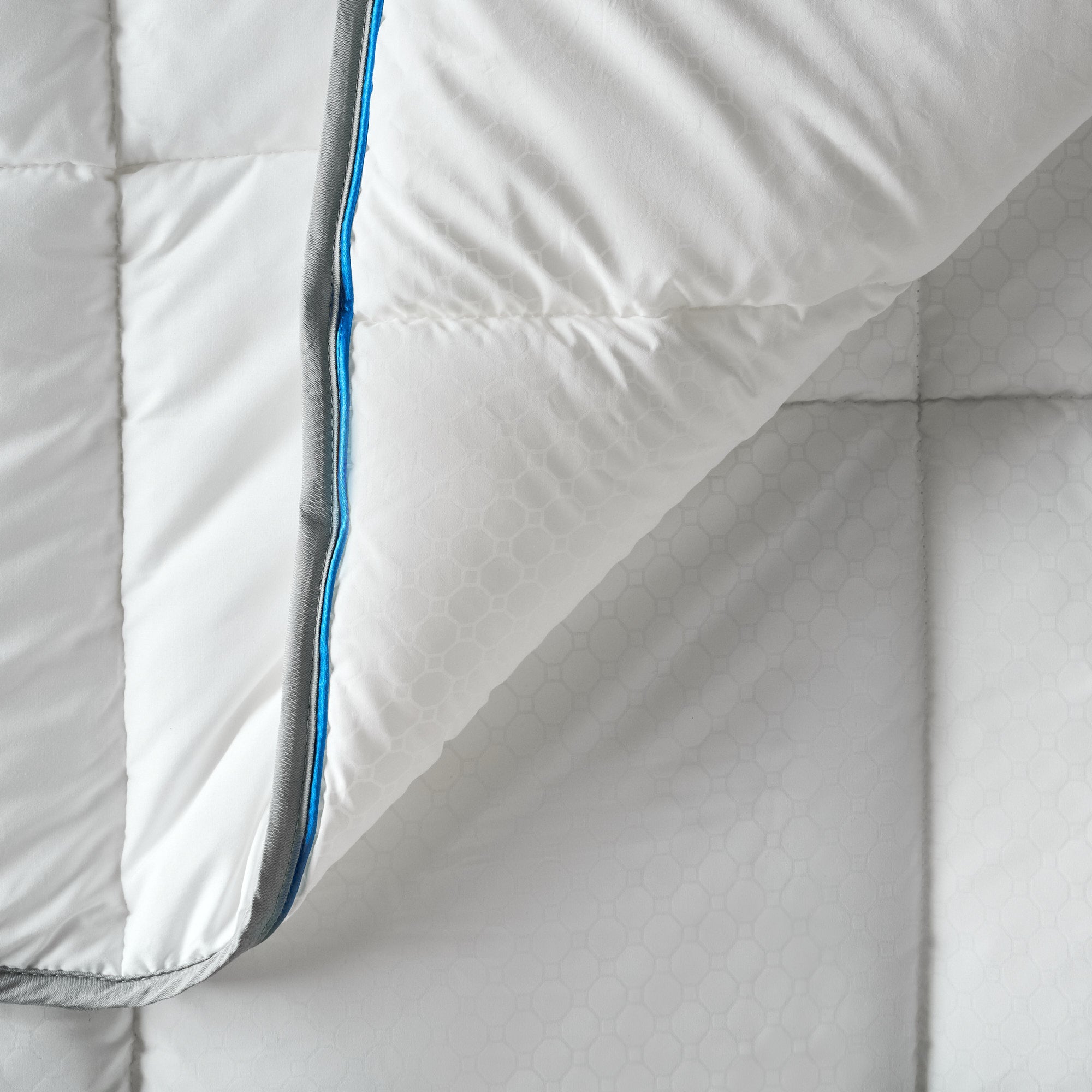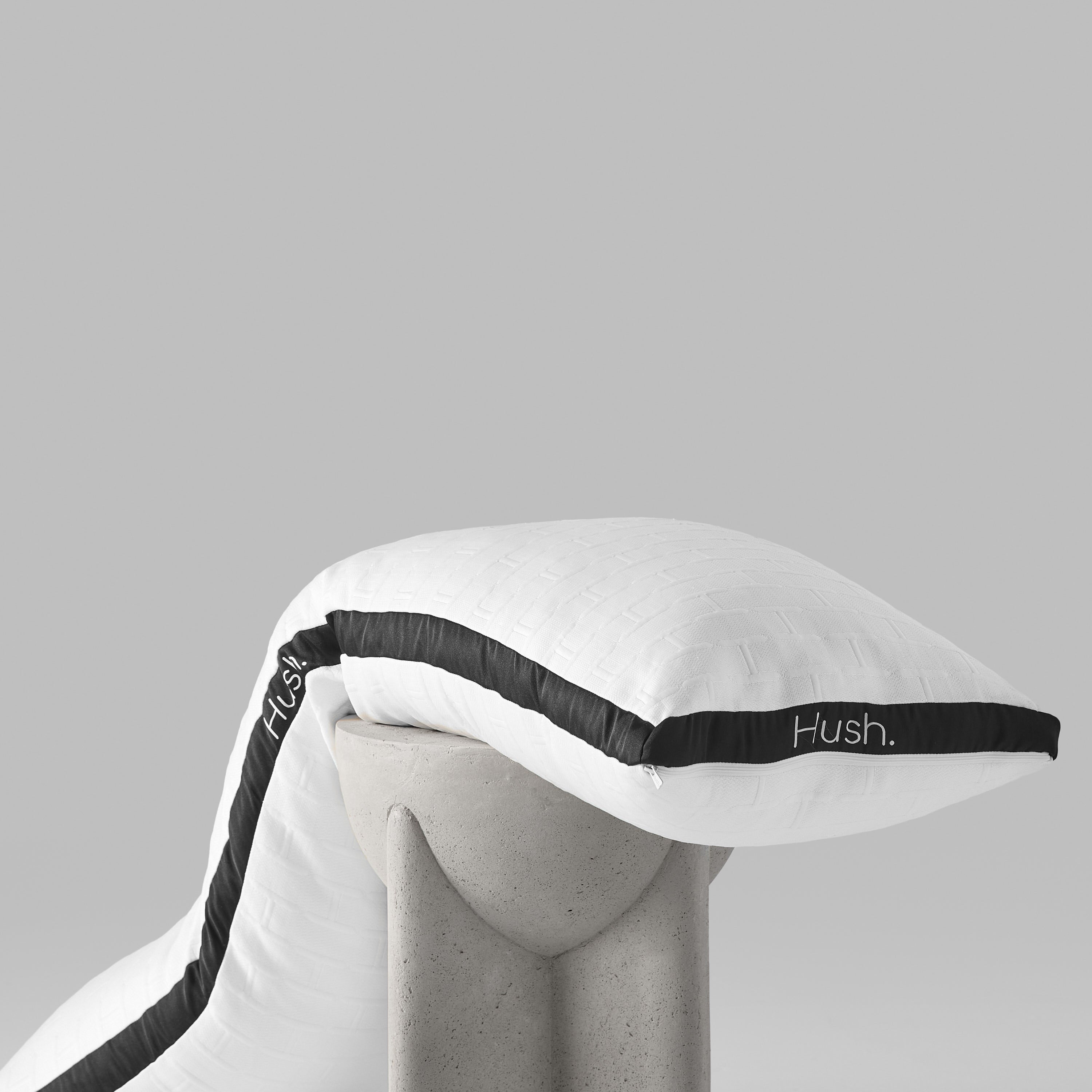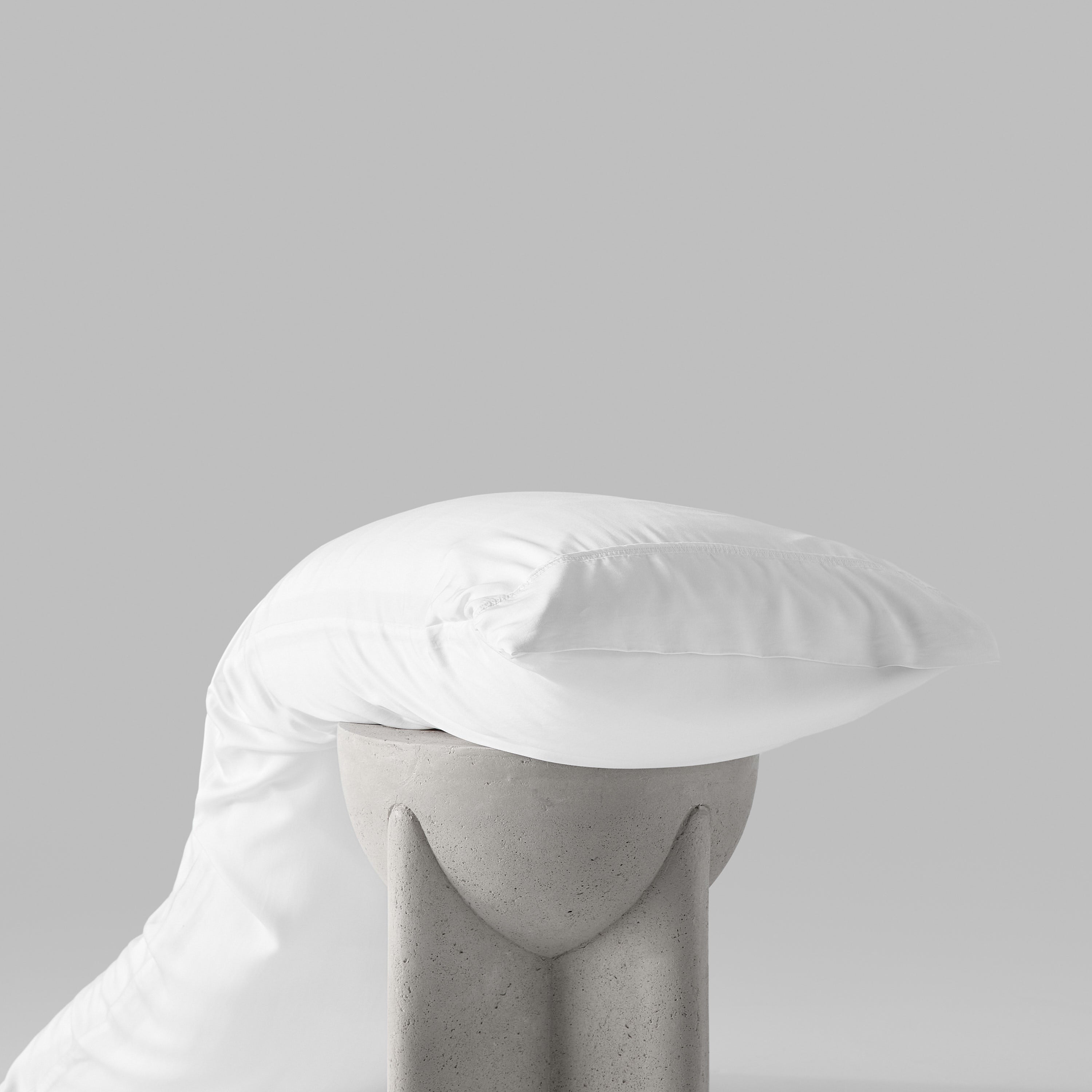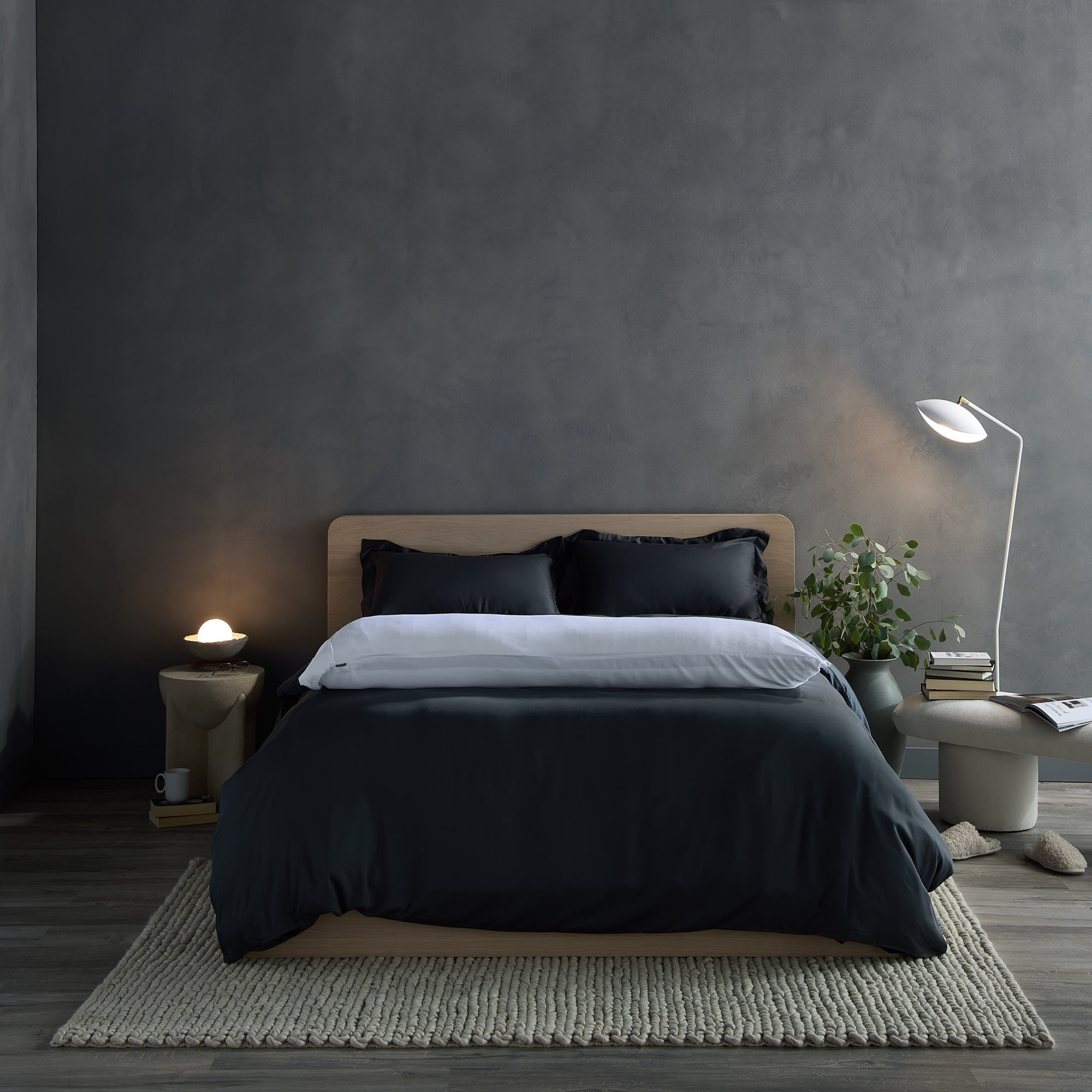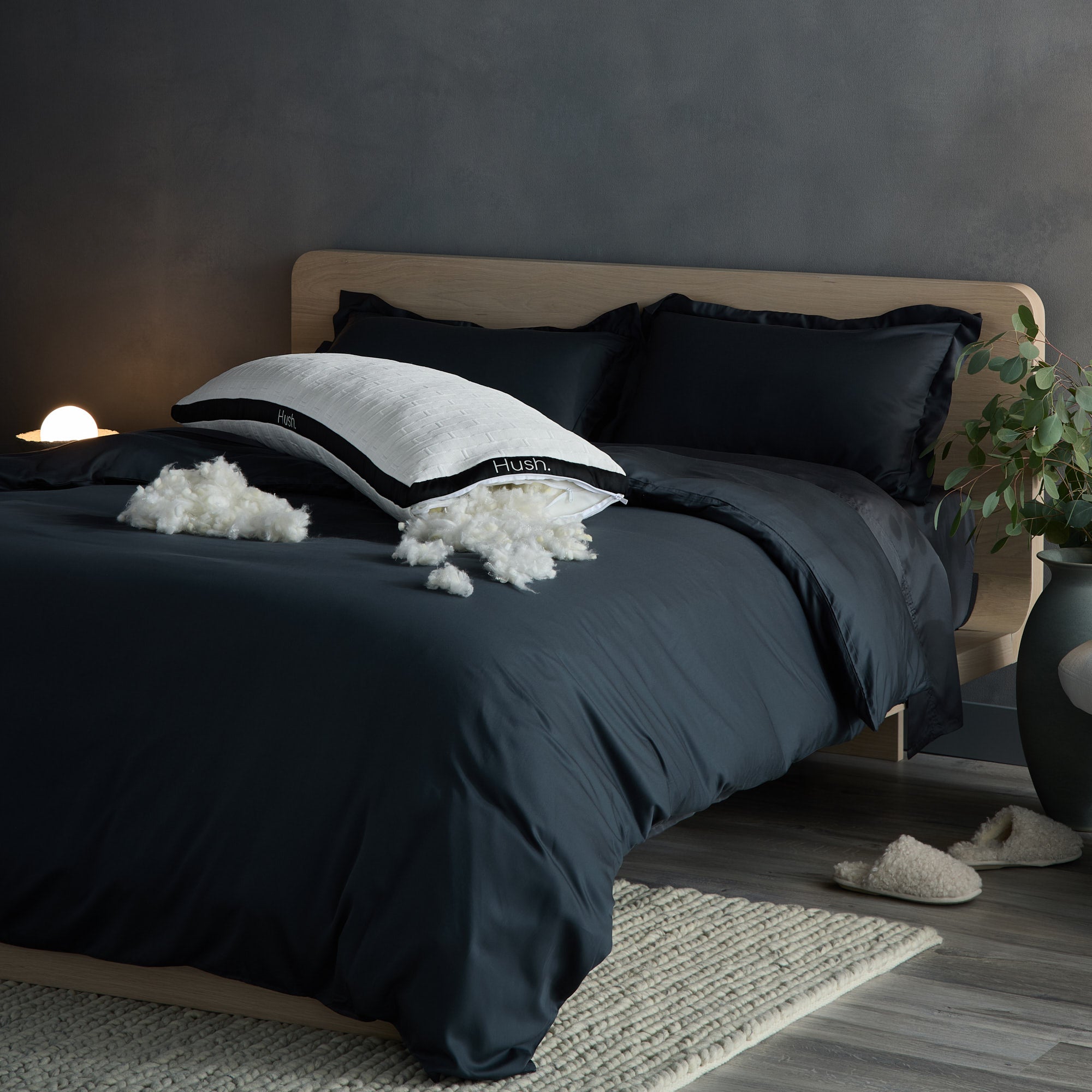If you struggle with insomnia, you’ve likely already tried a variety of remedies: improved sleep hygiene, chamomile tea, yoga, meditation, cognitive behavior therapy, over-the-counter sleep aids, maybe even prescription sleep medicine. But what about weighted blankets?
As you’ll see in this article, weighted blankets have many benefits. Read on to learn about how weighted blankets work, what the scientific evidence says about weighted blankets, and the best weighted blanket for insomnia. (And in case you’re in a hurry, we’ll go ahead and tell you: There’s no better choice than Hush weighted blankets. Try the Iced 2.0 if you’re a hot sleeper.)
At a glance:
The Science Behind Weighted Blankets and Insomnia

There’s no shortage of hype surrounding weighted blankets, but what does the actual science have to say about them?
A small body of scientific research suggests weighted blankets can improve not just insomnia, but anxiety as well. While more research needs to be done, the preliminary research thus far is very promising in favor of the benefits of weighted blankets.
120-Person Weighted Blanket Trial Shows Promising Results
One of the most commonly cited studies on the matter is a randomized controlled trial from the Journal of Clinical Sleep Medicine. In this study, 120 patients with psychiatric disorders (major depressive disorder, generalized anxiety disorder, attention deficit hyperactivity disorder, and bipolar disorder) were split into two groups.
Members of the experimental group were given a weighted metal chain blanket, and members of the control group were given a light plastic chain blanket. Participants were blind to their treatment group, meaning they weren’t supposed to know if they had the weighted blanket or the light blanket.
Both groups were then instructed to use these blankets while they slept for four weeks. Surveys were given to participants to measure perceived levels of insomnia and anxiety, and actigraphs (wrist monitors) were used to measure objective sleep metrics.
After four weeks, not only did the weighted blanket group experience lower levels of perceived insomnia as well as increased daytime activity levels, but they also had fewer symptoms of depression and anxiety.
Insomnia Linked to Depression and Anxiety
As we just saw, the study from the Journal of Clinical Sleep Medicine found weighted blankets could reduce symptoms of depression and anxiety. This is an especially important finding, as chronic insomnia is independently associated with depression and anxiety (via a study from the journal Sleep).
Study Shows Weighted Blanket Reduces Anxiety
Other studies have found similar results. A study from Occupational Therapy in Mental Health used a concurrent, nested, mixed methods exploratory approach to determine the safety and effectiveness of weighted blankets. In this study, 32 adults were each given a 30-pound weighted blanket. They were also given an anxiety survey, and their vital signs were measured.
More specifically, the study measured participants’ electrodermal activity (EDA) and their scores on the State Trait Anxiety Inventory-10. Results showed that 33% of participants had lower levels of EDA while using the blanket, and 63% reported lowered anxiety. A total of 78% – the vast majority – preferred using the blanket as a calming technique.
Additionally, the researchers also measured participants’ blood pressure, heart rate, and blood oxygen level to determine how safe the weighted blankets were to use. According to this data, there were no safety concerns regarding the weighted blankets.
Systematic Review: More Research Is Needed
Of course, these are just individual studies. For more convincing scientific research, we turn to a systematic review from the American Journal of Occupational Therapy that compiled data from eight different studies on weighted blankets. (As the researchers note, this is a fairly small pool of studies for a systematic review, because research on the subject is still fairly limited.)
This systematic review concluded that there is strong evidence to support the use of weighted blankets for reducing anxiety. But what about insomnia? The researchers claim there wasn’t enough evidence to suggest weighted blankets can improve insomnia, and that more research is needed.
As we’ve already seen, though, there is some evidence that weighted blankets can improve insomnia – we just need more studies to confirm these findings. Of course, if your insomnia is due to anxiety, or related to anxiety in any way, then you’re very likely to sleep better with a weighted blanket, since the findings related to anxiety are so strong.
Anecdotal Evidence for Weighted Blankets & Insomnia
While we’re all eager for more scientific research to explore the potential benefits of weighted blankets on insomnia, we can always turn to anecdotal evidence in the meantime to see how well weighted blankets help people sleep.
Many reviewers have commented that they’re getting the best sleep of their lives when they use our weighted blankets. Some specifically mention lifelong insomnia, and how amazed they are that a weighted blanket could help this chronic condition. One satisfied reviewer exclaims, “I have NEVER slept so well!”
And many more talk about how much it helps to reduce stress and anxiety. As one reviewer puts it, “Life-changing! Diagnosed with PTSD, anxiety, depression, social anxiety, agoraphobia. Life can be exhausting and I slept for 20 hours under this amazing blanket!”
A few customers also mention how quickly they fall asleep when they use our weighted blankets. For instance, one reviewer says, “Fall asleep faster and have better quality sleep.” Another says, “Why didn’t I buy this sooner? Fast to ship, fast to delivery, fast to fall asleep under it.”
Others comment that it’s the best blanket they’ve ever used. One reviewer calls it the “comfiest blanket ever owned,” and two more call it the “best blanket ever” and the “best weighted blanket ever.”
Yet another reviewer says, “Since I've got my Hush I sleep better I don't toss as much and don't wake up as much either. I love how soft it is. It's like a cloud. I was worried I would feel the weight but you don't feel it. I can't sleep without it.”
The duvet cover is described by one reviewer as “super soft” and “so luxurious,” even after repeated washings.
So, go ahead and try one of our Hush weighted blankets to see what they can do for your insomnia and anxiety. You may just find that you can’t sleep without it. And with our 100-Night Sleep Guarantee, you can rest assured that if you don’t love it for any reason, you can send it back for a full refund – no questions asked.
How Weighted Blankets Work
The idea behind weighted blankets is fairly simple: The extra weight from the blanket puts extra pressure on your body as you sleep, like a full-body hug. Some have even suggested the effects could be similar to those of deep tissue massage or acupressure, both of which relieve muscle tension in part by applying pressure to your muscles.
In this section, we’ll explain what exactly is in a weighted blanket, how they work, and how you can choose one to suit your needs.
What’s in a Weighted Blanket
So, how do weighted blankets get that extra weight? While different companies use different materials, the basic structure is the same: Weighted pellets are sewn into the inner fabric of the blanket. They may even be glued on with a plastic spray gun to help them stick. The weighted pellets can be made of plastic, glass, metal, or sand, and they can be large or small.
Despite the work that’s done to keep the weighted pellets in place, they can often move around inside the blanket once they’re fully enclosed. For the best weight distribution, some companies sew individual pockets into the blanket, to keep the pellets from one pocket from migrating into another pocket. Using smaller pellets also helps keep an even weight distribution.
Choosing the Right Weight
Weighted blankets come in many different sizes – and weights. They may weigh as little as three pounds or as much as 35 pounds. As a general rule, the weight of the blanket should be about 10% of your body weight. If you sleep with a partner and plan to share the blanket with them, you’ll want a blanket that weighs 10% of your combined weight.
For example, if you weigh 150 pounds, you’ll want a blanket that weighs about 15 pounds. If you sleep with a partner who weighs 200 pounds, then your combined weight is 350 pounds, so you’ll want a blanket that weighs 35 pounds.
Of course, the weight also depends on the size of the blanket. This means you may have to choose between a blanket that fits your bed and a blanket that satisfies your weight needs.
For instance, if you sleep on a queen-size but weigh only 120 pounds, you might have trouble finding a queen-size blanket that weighs 12 pounds. You may be better off choosing a smaller blanket to make sure it’s the right weight, rather than choosing a blanket that fits your bed but turns out to be too heavy.
It’s also worth considering your individual preferences. Maybe you want something a little heavier or a little lighter than the standard recommendation. As long as you’re able to lift the blanket off of you, there’s no harm in trying a blanket that’s heavier than the standard recommendation.
Choosing the Right Material
While weight plays an important role here, the type of fabric that’s used is just as important. After all, what good is a weighted blanket if it doesn’t feel comfortable to you?
A weighted blanket will typically come with a removable duvet cover. This is the part of the blanket that needs to be soft and comfortable, since it’s going to make contact with you. This is also the part of the blanket that’s usually machine washable. (You definitely don’t want to throw the entire blanket in your washing machine.)
The duvet cover could be made of any type of material, so it’s worth considering what sort of material you find most comfortable: bamboo fabric, cotton, microfiber, etc. If you’re a hot sleeper, you’ll want to find a fabric that’s breathable and moisture-wicking to help you avoid overheating under all that weight.
Weighted Blankets for Insomnia: Worth a Try
So if you want to try a weighted blanket, it’s definitely worth a try. While the research on insomnia still needs a bit of time, anecdotal evidence is strong. Plus, if your insomnia is linked to anxiety, you should definitely try a weighted blanket — the science clearly backs weighted blankets for anxiety.
Either way, you can always try one of our weighted blankets for 100 days to see if it works for you. If it doesn’t, just send it back for a full refund. No questions asked.
Best Weighted Blanket for Insomnia
Now that we’ve seen some of the scientific evidence that weighted blankets can help with insomnia and anxiety, let’s talk about which weighted blanket you should try.
The Benefits of Hush Weighted Blankets
At Hush, we offer the best cooling weighted blankets on the market. If you tend to get cold when you sleep, fear not: The Hush Classic blanket will keep you warm. So, whether or not you’re a hot sleeper, we’ve got a weighted blanket that will work for you.
Why are we so confident our weighted blankets are the best? Let’s start with the cover. The Hush Classic has a super-soft, minky threading which customers describe as “soooo comfortable” and cozy. The Hush Iced 2.0 uses a groundbreaking bamboo fabric to pull heat away from your body, and it is also very soft. Both duvet covers are machine washable.
Underneath that cozy duvet cover is where the magic happens: We use glass sand to add weight to the blanket (instead of pellets). This gives it a very even weight distribution, much better than weighted blankets that advertise “small” glass pellets. The glass sand also helps keep the blanket cooler, since it traps less heat than larger glass pellets.
But how do we get the glass sand to stay in place? We’re familiar with the plastic spray guns other companies use to create stickiness inside the blanket to get the pellets to stick – not only did we want to avoid the use of plastic, but we wanted a more precise method. The spray gun method can be very imprecise, creating lumps in the blanket before it’s even used.
This is why we special-ordered a proprietary machine to sew each little grain of glass sand in place. No plastic spray required! It’s non-toxic, and it’s much more effective than the spray gun approach.
Additionally, we create pockets inside the blanket to ensure every bit of glass sand stays in place. Because the individual grains of glass sand are so much smaller than glass pellets, we’re able to fit more of them into each pocket, which helps keep the weight of the blanket as evenly-distributed as possible.
The end result is the most comfortable, evenly-distributed weighted blanket you can find. This is especially good news for restless sleepers Toss and turn all you want, and the weight inside the blanket will never start to clump.
What’s more, you don’t have to worry about it slipping off the bed in the middle of the night, the way some other weighted blankets might. In fact, while most companies will tell you not to buy a weighted blanket that hangs over the edges of your bed, our blankets have such good weight distribution that you don’t have to worry about this.
Our blankets come in five different sizes corresponding to different bed sizes, and each blanket is made to be longer and wider than the size of the bed it’s meant to be used for. This is because you don’t have to worry about the weight clumping in the part of the blanket that hangs off the bed, dragging the whole blanket down. This doesn’t happen with our blankets.



